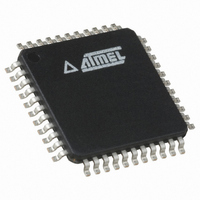ATMEGA32-16AU Atmel, ATMEGA32-16AU Datasheet - Page 160

ATMEGA32-16AU
Manufacturer Part Number
ATMEGA32-16AU
Description
IC AVR MCU 32K 16MHZ 5V 44TQFP
Manufacturer
Atmel
Series
AVR® ATmegar
Specifications of ATMEGA32-16AU
Core Processor
AVR
Core Size
8-Bit
Speed
16MHz
Connectivity
I²C, SPI, UART/USART
Peripherals
Brown-out Detect/Reset, POR, PWM, WDT
Number Of I /o
32
Program Memory Size
32KB (16K x 16)
Program Memory Type
FLASH
Eeprom Size
1K x 8
Ram Size
2K x 8
Voltage - Supply (vcc/vdd)
4.5 V ~ 5.5 V
Data Converters
A/D 8x10b
Oscillator Type
Internal
Operating Temperature
-40°C ~ 85°C
Package / Case
44-TQFP, 44-VQFP
Processor Series
ATMEGA32x
Core
AVR8
Data Bus Width
8 bit
Data Ram Size
2 KB
Interface Type
2-Wire/SPI/USART
Maximum Clock Frequency
16 MHz
Number Of Programmable I/os
32
Number Of Timers
3
Operating Supply Voltage
4.5 V to 5.5 V
Maximum Operating Temperature
+ 85 C
Mounting Style
SMD/SMT
3rd Party Development Tools
EWAVR, EWAVR-BL
Development Tools By Supplier
ATAVRDRAGON, ATSTK500, ATSTK600, ATAVRISP2, ATAVRONEKIT
Minimum Operating Temperature
- 40 C
On-chip Adc
8-ch x 10-bit
Controller Family/series
AVR MEGA
No. Of I/o's
32
Eeprom Memory Size
1KB
Ram Memory Size
2KB
Cpu Speed
16MHz
No. Of Timers
3
Rohs Compliant
Yes
Cpu Family
ATmega
Device Core
AVR
Device Core Size
8b
Frequency (max)
16MHz
Total Internal Ram Size
2KB
# I/os (max)
32
Number Of Timers - General Purpose
3
Operating Supply Voltage (typ)
5V
Operating Supply Voltage (max)
5.5V
Operating Supply Voltage (min)
4.5V
Instruction Set Architecture
RISC
Operating Temp Range
-40C to 85C
Operating Temperature Classification
Industrial
Mounting
Surface Mount
Pin Count
44
Package Type
TQFP
For Use With
ATSTK524 - KIT STARTER ATMEGA32M1/MEGA32C1ATSTK600-TQFP32 - STK600 SOCKET/ADAPTER 32-TQFPATSTK600-TQFP44 - STK600 SOCKET/ADAPTER 44-TQFPATSTK600-DIP40 - STK600 SOCKET/ADAPTER 40-PDIP770-1007 - ISP 4PORT ATMEL AVR MCU SPI/JTAG770-1005 - ISP 4PORT FOR ATMEL AVR MCU JTAG770-1004 - ISP 4PORT FOR ATMEL AVR MCU SPIATAVRDRAGON - KIT DRAGON 32KB FLASH MEM AVRATAVRISP2 - PROGRAMMER AVR IN SYSTEMATJTAGICE2 - AVR ON-CHIP D-BUG SYSTEMATSTK500 - PROGRAMMER AVR STARTER KIT
Lead Free Status / RoHS Status
Lead free / RoHS Compliant
Available stocks
Company
Part Number
Manufacturer
Quantity
Price
Part Number:
ATMEGA32-16AU
Manufacturer:
ATMEL
Quantity:
20 000
USART Control and
Status Register A –
UCSRA
2503Q–AVR–02/11
data into the transmit Shift Register when the Shift Register is empty. Then the data will be seri-
ally transmitted on the TxD pin.
The receive buffer consists of a two level FIFO. The FIFO will change its state whenever the
receive buffer is accessed. Due to this behavior of the receive buffer, do not use read modify
write instructions (SBI and CBI) on this location. Be careful when using bit test instructions (SBIC
and SBIS), since these also will change the state of the FIFO.
• Bit 7 – RXC: USART Receive Complete
This flag bit is set when there are unread data in the receive buffer and cleared when the receive
buffer is empty (that is, does not contain any unread data). If the receiver is disabled, the receive
buffer will be flushed and consequently the RXC bit will become zero. The RXC Flag can be
used to generate a Receive Complete interrupt (see description of the RXCIE bit).
• Bit 6 – TXC: USART Transmit Complete
This flag bit is set when the entire frame in the transmit Shift Register has been shifted out and
there are no new data currently present in the transmit buffer (UDR). The TXC Flag bit is auto-
matically cleared when a transmit complete interrupt is executed, or it can be cleared by writing
a one to its bit location. The TXC Flag can generate a Transmit Complete interrupt (see descrip-
tion of the TXCIE bit).
• Bit 5 – UDRE: USART Data Register Empty
The UDRE Flag indicates if the transmit buffer (UDR) is ready to receive new data. If UDRE is
one, the buffer is empty, and therefore ready to be written. The UDRE Flag can generate a Data
Register empty Interrupt (see description of the UDRIE bit).
UDRE is set after a reset to indicate that the transmitter is ready.
• Bit 4 – FE: Frame Error
This bit is set if the next character in the receive buffer had a Frame Error when received. that is,
when the first stop bit of the next character in the receive buffer is zero. This bit is valid until the
receive buffer (UDR) is read. The FE bit is zero when the stop bit of received data is one. Always
set this bit to zero when writing to UCSRA.
• Bit 3 – DOR: Data OverRun
This bit is set if a Data OverRun condition is detected. A Data OverRun occurs when the receive
buffer is full (two characters), it is a new character waiting in the receive Shift Register, and a
new start bit is detected. This bit is valid until the receive buffer (UDR) is read. Always set this bit
to zero when writing to UCSRA.
• Bit 2 – PE: Parity Error
This bit is set if the next character in the receive buffer had a Parity Error when received and the
parity checking was enabled at that point (UPM1 = 1). This bit is valid until the receive buffer
(UDR) is read. Always set this bit to zero when writing to UCSRA.
Bit
Read/Write
Initial Value
RXC
R
7
0
TXC
R/W
6
0
UDRE
R
5
1
FE
4
R
0
DOR
R
3
0
PE
R
2
0
U2X
R/W
1
0
ATmega32(L)
MPCM
R/W
0
0
UCSRA
160
















